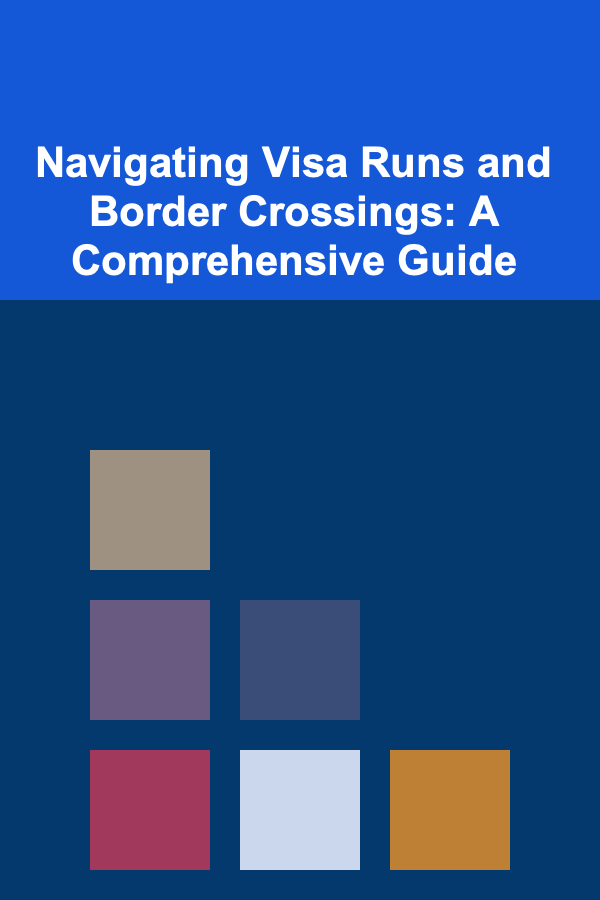
Navigating Visa Runs and Border Crossings: A Comprehensive Guide
ebook include PDF & Audio bundle (Micro Guide)
$12.99$5.99
Limited Time Offer! Order within the next:

Visa runs and border crossings are a reality for many expatriates, digital nomads, long-term travelers, and individuals residing abroad on temporary visas. These processes, while sometimes perceived as bureaucratic hurdles, are often essential for maintaining legal residency or extending stays in a desired location. Understanding the intricacies of visa regulations, border crossing procedures, and potential pitfalls is crucial for a smooth and stress-free experience. This comprehensive guide aims to provide in-depth knowledge and practical advice on navigating visa runs and border crossings effectively.
Understanding the Basics: Why Visa Runs Are Necessary
A visa run, often referred to as a "border hop," typically involves leaving a country before the expiration of a visa or permitted stay, and then immediately re-entering, often on a new visa or under a visa-exempt arrangement. The primary reason individuals undertake visa runs is to extend their stay beyond the initial validity period allowed by their existing visa or entry permit.
Here's a breakdown of common scenarios that necessitate visa runs:
- Limited Visa Validity: Many countries issue visas with specific validity periods, such as 30, 60, 90, or 180 days. Once this period expires, the individual is required to leave the country.
- Visa-Exempt Stays: Some countries offer visa-free entry to citizens of certain nationalities for a limited duration (e.g., 30 or 90 days). To remain longer, a visa run to a neighboring country is often necessary to reset the clock.
- Visa-on-Arrival Limitations: Visa-on-arrival (VOA) options can be convenient, but they often come with shorter validity periods compared to visas obtained in advance. Visa runs are sometimes used to repeatedly obtain VOAs.
- Extended Tourism or Exploration: Individuals who wish to travel and explore a country for an extended period, surpassing the initial visa validity, may resort to visa runs to continue their journey.
- Bridging Visa Gaps: Sometimes, individuals awaiting the processing of a long-term visa (e.g., a work visa or residency permit) may use visa runs to maintain legal residency while the application is being processed.
It's important to note that while visa runs can be a practical solution, they are not always guaranteed to be successful and can sometimes be subject to scrutiny by immigration authorities. Understanding the specific regulations of the countries involved is paramount.
Planning Your Visa Run: Essential Considerations
Proper planning is the cornerstone of a successful visa run. Rushing into the process without adequate preparation can lead to complications, delays, or even denial of re-entry. Consider these key factors when planning your visa run:
1. Visa Regulations and Requirements: The Foundation of Your Plan
Before embarking on a visa run, thoroughly research the visa regulations of both the country you are departing from and the country you intend to visit. This includes:
- Visa Validity: Confirm the exact expiration date of your current visa or permitted stay.
- Entry Requirements: Determine the visa requirements for your nationality in the destination country. Can you enter visa-free, obtain a visa on arrival, or do you need to apply for a visa in advance?
- Visa Validity and Duration of Stay: Understand the validity period and maximum duration of stay granted with the new visa or visa-exempt entry.
- Re-entry Policies: Check if there are any restrictions on the number of consecutive visa runs allowed or minimum stay requirements outside the country before re-entry. Some countries frown upon frequent border hops.
- Passport Validity: Ensure your passport has sufficient validity remaining (typically at least six months beyond your intended stay).
- Proof of Funds: Some countries require proof that you have sufficient funds to support your stay. This may involve presenting bank statements or credit card statements.
- Onward Travel: Be prepared to show proof of onward travel, such as a flight or bus ticket, demonstrating your intention to leave the country before your visa expires.
Resource Tip: Official government websites of the immigration departments of both countries are the most reliable sources of information. Cross-reference information with experienced expatriate forums and communities, but always prioritize official sources.
2. Choosing Your Destination: Proximity, Visa Options, and Logistics
Selecting the right destination for your visa run is a critical decision. Consider these factors:
- Proximity: Choose a neighboring country or a location easily accessible by land, air, or sea. This minimizes travel time and costs.
- Visa Options: Opt for a destination that offers convenient visa options for your nationality, such as visa-free entry, visa on arrival, or a relatively straightforward visa application process at a local embassy or consulate.
- Accessibility of Consulates/Embassies: If you need to apply for a visa in advance, choose a destination with readily accessible embassies or consulates of the country you plan to return to.
- Cost of Living: Factor in the cost of accommodation, transportation, food, and visa fees in the destination country.
- Transportation Options: Research available transportation options (bus, train, plane, ferry) and book tickets in advance, especially during peak season.
- Security and Safety: Prioritize destinations with a stable political climate and a low crime rate. Check travel advisories issued by your home country.
3. Timing is Everything: Avoiding Overstay Penalties and Peak Seasons
Careful timing is essential to avoid overstay penalties and potential complications at the border.
- Avoid Overstaying: Strictly adhere to the expiration date of your visa or permitted stay. Even a single day of overstay can result in fines, detention, or even a ban from re-entering the country.
- Plan Buffer Time: Allow ample buffer time for potential travel delays, unexpected circumstances, and visa processing times.
- Consider Peak Seasons: Avoid traveling during peak tourist seasons or major holidays, as border crossings can be more crowded and immigration officials may be more scrutinizing.
- Check Consulate/Embassy Hours: If you require consular services, verify the operating hours and holiday closures of the relevant embassies or consulates.
4. Documentation: Preparing Essential Paperwork
Gather all necessary documentation well in advance. Being organized can significantly expedite the process and minimize stress.
- Passport: Ensure your passport is valid and has sufficient blank pages for entry and exit stamps.
- Visa: Carry a copy of your current visa (if applicable).
- Entry/Exit Stamps: Note the dates of your entry and exit stamps to accurately calculate your allowed stay.
- Onward Travel Ticket: Have a confirmed onward travel ticket (flight, bus, or train) showing your departure from the country you are re-entering.
- Proof of Accommodation: Carry proof of accommodation in the destination country, such as a hotel reservation or rental agreement.
- Proof of Funds: Prepare bank statements, credit card statements, or other documentation to demonstrate your financial solvency.
- Photocopies: Make photocopies of all important documents and store them separately from the originals.
- Passport Photos: Carry passport-sized photos, as they may be required for visa applications.
- Letter of Explanation (Optional): If you have a complex situation or are concerned about potential scrutiny, consider preparing a brief letter explaining the purpose of your visit and your intention to comply with immigration regulations.
5. Budgeting for Your Visa Run: Accounting for All Expenses
Calculate the total cost of your visa run, including:
- Transportation Costs: Bus, train, plane, or ferry tickets.
- Visa Fees: Fees for obtaining a new visa or extending your existing one.
- Accommodation Costs: Hotel or hostel expenses.
- Food and Drink: Daily living expenses.
- Transportation within the Destination Country: Local buses, taxis, or ride-sharing services.
- Insurance: Travel insurance covering medical emergencies and unexpected events.
- Miscellaneous Expenses: Souvenirs, entertainment, and unexpected costs.
Having a clear budget helps you avoid financial surprises and ensures you have sufficient funds to cover all expenses.
Navigating the Border Crossing: Practical Tips and Best Practices
The border crossing itself can be a nerve-wracking experience. Here are some practical tips to help you navigate the process smoothly:
1. Dress Appropriately and Be Respectful: First Impressions Matter
Dress neatly and respectfully when crossing the border. Avoid wearing overly casual or revealing clothing. A professional appearance can make a positive first impression on immigration officials.
2. Be Polite and Courteous: A Little Kindness Goes a Long Way
Treat immigration officials with politeness and respect. Maintain a calm and respectful demeanor, even if you are feeling stressed or anxious. A smile and a courteous attitude can go a long way in defusing potentially tense situations.
3. Answer Questions Honestly and Concisely: Providing Clear and Accurate Information
Answer all questions truthfully and concisely. Avoid providing unnecessary information or volunteering details that are not directly relevant to the questions being asked. Stick to the facts and avoid making assumptions or embellishments.
4. Present Your Documents Clearly and Organized: Streamlining the Process
Present your documents in a clear and organized manner. Have your passport, visa (if applicable), onward travel ticket, and other relevant documents readily accessible. This demonstrates preparedness and makes it easier for immigration officials to verify your information.
5. Understand Your Rights and Responsibilities: Knowing Your Legal Standing
Familiarize yourself with your rights and responsibilities as a traveler. While it's important to be cooperative, you also have the right to be treated fairly and with respect. Know the procedures for appealing a denied entry or addressing any concerns you may have.
6. Stay Calm and Patient: Dealing with Delays and Unexpected Situations
Border crossings can sometimes be subject to delays or unexpected circumstances. Stay calm and patient, even if you encounter long lines or processing delays. Avoid getting frustrated or argumentative, as this can only exacerbate the situation.
7. Avoid Making False Statements: Honesty is the Best Policy
Never make false statements or provide misleading information to immigration officials. Lying or misrepresenting your intentions can have serious consequences, including denial of entry, fines, or even legal prosecution.
8. Keep Copies of Important Documents Separate: Safeguarding Against Loss or Theft
Keep copies of your important documents separate from the originals. This protects you in case the originals are lost or stolen.
9. Declare Goods Honestly: Adhering to Customs Regulations
Declare all goods you are carrying that may be subject to customs duties or restrictions. Failing to declare items can result in fines or confiscation of goods.
10. Have Emergency Contact Information Readily Available: Being Prepared for the Unexpected
Keep emergency contact information readily available, including the phone numbers of your embassy or consulate, family members, and friends. In case of an emergency, this information can be crucial for obtaining assistance.
Potential Pitfalls and How to Avoid Them
While visa runs can be a viable strategy, it's essential to be aware of potential pitfalls and take steps to mitigate the risks.
1. Overstaying Your Visa: Consequences and Prevention
Overstaying your visa is a serious offense that can have severe consequences, including:
- Fines: You may be subject to fines for each day you overstay.
- Detention: You may be detained by immigration authorities.
- Deportation: You may be deported from the country.
- Entry Ban: You may be banned from re-entering the country for a specified period or permanently.
Prevention:
- Track Your Visa Expiration Date: Set reminders and track your visa expiration date meticulously.
- Allow Ample Buffer Time: Plan your visa run well in advance and allow ample buffer time for potential travel delays.
- Document Your Departure: Keep a copy of your exit stamp or other proof of departure to demonstrate that you complied with visa regulations.
2. Repeated Visa Runs: Suspicion and Scrutiny
Frequent visa runs can raise suspicion among immigration officials, who may perceive you as attempting to circumvent immigration laws or engage in unauthorized activities. This can lead to increased scrutiny, questioning, and potential denial of entry.
Mitigation:
- Diversify Your Destinations: If possible, alternate between different destination countries for your visa runs.
- Obtain a Longer-Term Visa: If you plan to stay in a country for an extended period, explore options for obtaining a longer-term visa, such as a tourist visa, student visa, or work visa.
- Provide a Legitimate Explanation: Be prepared to provide a clear and legitimate explanation for your frequent visa runs. Highlight your tourism activities, volunteer work, or other legitimate reasons for your extended stay.
- Demonstrate Financial Stability: Show that you have sufficient funds to support yourself and are not relying on illegal employment.
3. Insufficient Funds: Inability to Support Yourself
Immigration officials may deny entry if they believe you do not have sufficient funds to support yourself during your stay. This is particularly relevant for tourists and those seeking visa-free entry.
Prevention:
- Carry Bank Statements: Have readily available copies of your bank statements or credit card statements demonstrating your financial solvency.
- Set a Travel Budget: Create a detailed travel budget and ensure you have sufficient funds to cover all anticipated expenses.
- Consider a Prepaid Travel Card: Load a prepaid travel card with sufficient funds to demonstrate your financial resources.
4. Lack of Onward Travel: Perceived Risk of Overstaying
Immigration officials may deny entry if you cannot provide proof of onward travel, as this can raise concerns that you intend to overstay your visa or remain in the country illegally.
Prevention:
- Purchase an Onward Travel Ticket: Buy a confirmed flight, bus, or train ticket showing your departure from the country before your visa expires.
- Consider a Refundable Ticket: If you are unsure of your travel plans, consider purchasing a refundable onward travel ticket.
- Rent a Ticket: Several online services allow you to rent a flight ticket for a short period, providing proof of onward travel without the commitment of purchasing a full-price ticket. (Use these services with caution and research their legitimacy).
5. Suspicious Activities or Criminal Record: Potential Grounds for Denial
If you have a criminal record or are suspected of engaging in illegal activities, immigration officials may deny you entry. Past visa violations can also negatively impact your chances of re-entry.
Mitigation:
- Be Honest About Your Background: If you have a criminal record, be honest and transparent with immigration officials. Provide documentation related to your case, such as court records or rehabilitation certificates.
- Demonstrate Good Conduct: Show that you have maintained good conduct since any past offenses.
- Seek Legal Advice: If you have concerns about your eligibility for entry, consult with an immigration lawyer for guidance.
6. Health Concerns: Risk of Public Health Threat
In certain cases, immigration officials may deny entry if they believe you pose a risk to public health, such as having a contagious disease. Certain countries may require proof of vaccination against specific diseases.
Prevention:
- Obtain Necessary Vaccinations: Check the vaccination requirements for the countries you plan to visit and obtain any necessary vaccinations well in advance.
- Carry Medical Documentation: Carry a copy of your vaccination record and any relevant medical documentation.
- Declare Any Medical Conditions: If you have a pre-existing medical condition, declare it to immigration officials and provide any necessary medical information.
Alternative Strategies to Visa Runs
While visa runs are a common practice, there are alternative strategies that may be more suitable depending on your individual circumstances.
1. Applying for a Longer-Term Visa: Stability and Peace of Mind
If you plan to stay in a country for an extended period, consider applying for a longer-term visa, such as a tourist visa with multiple entries, a student visa, a work visa, or a residency permit. This provides greater stability and eliminates the need for frequent visa runs.
2. Exploring Digital Nomad Visas: Tailored for Remote Workers
Several countries now offer digital nomad visas specifically designed for remote workers and freelancers. These visas typically allow you to reside in the country for a specified period (e.g., one year or longer) while working remotely for clients or companies based outside the country.
3. Considering Residency Programs: A Path to Long-Term Stay
Some countries offer residency programs that allow you to obtain permanent residency status based on factors such as investment, entrepreneurship, or retirement income. These programs can provide a pathway to long-term stay and eliminate the need for visa runs.
4. Utilizing Multi-Entry Visas: Flexibility and Convenience
If available, opt for a multi-entry visa that allows you to enter and exit the country multiple times within a specified period. This provides greater flexibility and eliminates the need for visa runs for each individual entry.
Conclusion: Navigating Borders with Knowledge and Confidence
Navigating visa runs and border crossings can be a complex and sometimes challenging process. However, by understanding the regulations, planning carefully, preparing thoroughly, and acting responsibly, you can significantly increase your chances of a smooth and successful experience. Remember to always prioritize accuracy, honesty, and respect when dealing with immigration officials. By embracing a proactive and informed approach, you can confidently navigate border crossings and enjoy your travels or extended stays abroad with peace of mind.
This guide provides a comprehensive overview of the key aspects of visa runs and border crossings. However, it's important to remember that immigration regulations can vary widely from country to country and are subject to change. Always consult official government sources and seek professional advice when necessary to ensure you comply with the latest requirements.
Reading More From Our Other Websites
- [Screen Printing Tip 101] Beyond the Basics: Innovative Screen-Print Effects to Transform Your Artwork
- [Home Cleaning 101] How to Remove Pet Hair from Furniture and Carpets Effectively
- [Organization Tip 101] How to Break Down Large Projects into Paperwork Tasks
- [Home Space Saving 101] How to Design Custom Built-In Storage for a Personalized Home
- [Paragliding Tip 101] Material Science: What Every Pilot Should Know About Wing Fabric Choices
- [Personal Care Tips 101] How to Boost Your Skin's Health with a Facial Scrub Routine
- [Organization Tip 101] How to Create a Schedule for Regular Decluttering Sessions
- [Personal Care Tips 101] How to Choose the Right Body Lotion for Mature Skin
- [Star Gazing Tip 101] Celestial Reflections: Using Stargazing to Reframe Personal Goals
- [Home Cleaning 101] How to Use The Best Mop for Tile Floors to Achieve Streak-Free Shine

Becoming a Project Manager: Key Approaches for Effective Project Execution
Read More
How to Create a Digital Library for Your Music Collection
Read More
How to Create a Kitchen Cabinet Organization Strategy
Read More
How to Layer Textures for a More Inviting Space
Read More
The Medical Researcher's Playbook: Essential Skills for Conducting Clinical and Laboratory Research
Read More
How to Understand Holographic Technology
Read MoreOther Products

Becoming a Project Manager: Key Approaches for Effective Project Execution
Read More
How to Create a Digital Library for Your Music Collection
Read More
How to Create a Kitchen Cabinet Organization Strategy
Read More
How to Layer Textures for a More Inviting Space
Read More
The Medical Researcher's Playbook: Essential Skills for Conducting Clinical and Laboratory Research
Read More